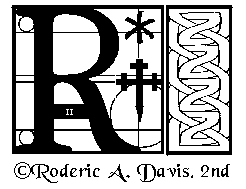|
Ergo: You are your own nth cousin.
Another way to look at it this: Children of cousins are also cousins, of an additional degree. For example, children of second cousins are third cousins. So, your parents being cousins, your mother's child and your father's child are cousins. The fact that these two children are actually the same person — you — makes no difference.
I forgot to address one point in my previous message. If your parents have more than one ancestor in common, you are your own cousin separately for each one. If the common ancestors are at different generations from yourself, the "degree" of cousin-ship will be different.
The situation may be further complicated by individuals along the "paths" you traced in my previous message. Any one of these people may be 'multiply related' to an ancestor further up your path, making her HER own nth cousin, and providing TWO paths between your ancestor and yourself. Each of these cases doubles the number of different possible paths between you and your ancestor. Technically, you are a cousin of yourself separately for each of these paths, although it is common practice to lump all the cases of 9th cousin-ship (for example) into one for reporting purposes.
| • | What does "3 generations removed" mean? |
| Don't feel too badly. Consider my situation: I am more closely related to Franklin D. Roosevelt (7th cousin, one generation removed) than I am to myself (7th cousin, two generations removed). |
 |
|
Neither this site nor its author have any connection with The Family Tree Maker program or its owner. Advice and suggestions offered here are to be used at your own risk. Your mileage may vary. Batteries not included.
| Email:dav4is@yahoo.com |
| Snail:
Roderic A. Davis, 2nd P.O. Box 118 Hyde Park, NY 12538 USA |